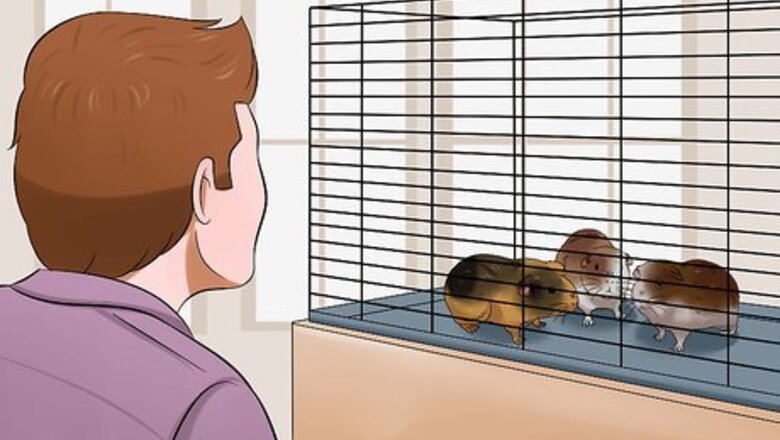
views
Deciding Where to Buy Your Guinea Pig
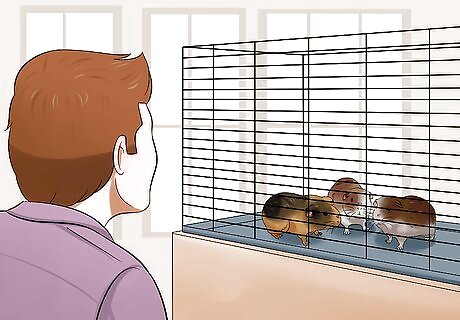
Consider pet stores. In many ways, a pet store is the most convenient route to purchasing a guinea pig. You can select and bring home your guinea pig on the same day without the wait and hassle you might encounter with a rescue. However, pet stores also have a number of drawbacks and many guinea pig owners advise against using them. You might end up with an unhealthy and poorly behaved pet. One downside to pet stores, or department stores, that sell guinea pigs and other small cage animals, is that workers are oftentimes not knowledgable about pet needs. Guinea pigs may be kept in poor conditions and workers might be unable to answer basic questions about caring for your new pet. Pet store guinea pigs are also often mislabeled in terms of breed and gender, so you won't know exactly what you're getting. A more reliable pet shop route would be well-known retailers, such as a local pet store with a solid reputation. In these types of stores, workers generally have some knowledge of guinea pig care. There is usually more of a process for adoption and you'll be provided information on guinea pig health, care, upkeep, and socialization. Prices vary depending on season, but guineas usually go for $30 to $60. Understand that pet stores shouldn't necessarily be your first option. They are notorious for selling improperly cared for guinea pigs and there are plenty of reports of customers buying pregnant or mixed sexed guinea pigs whilst being completely unaware. Most tend to sell equipment that are not suitable for guinea pigs too! Refrain from buying from a pet store unless you know they hold a good reputation.
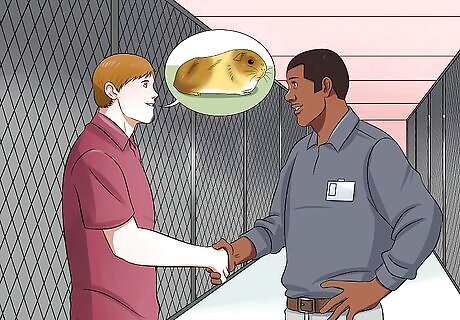
Think about a rescue. Guinea pig rescues help re-home guinea pigs that have been abandoned by former owners. Rescues tend to be more committed to finding quality homes for their pets, so you'll be taught how to care for your guinea pig if you go through a rescue. Websites like petfinder.com can help you locate guinea pigs in need of new homes in your area. Also, many animal shelters take guinea pigs and other exotic pets. Check shelters in your area to see if they take guinea pigs and if any are currently available for adoption. Adopting from a rescue is a process and the necessary work varies from shelter to shelter. Generally, there's some form of application in which you verify you're committed to providing a loving, safe home for your new pet. You may have to put down references. If so, choose other pet owners you have pet-sat for previously or people who have taken care of your animals in the past. Such people can confirm you're a responsible pet owner. Rescues can generally be trusted considering the workers there are mostly volunteers who put their energy and time towards raising ill-treated guinea pigs back to health and finding them loving homes. You can trust them to come home with a guinea pig which you know is healthy and you can leave confident that you haven't been misinformed.
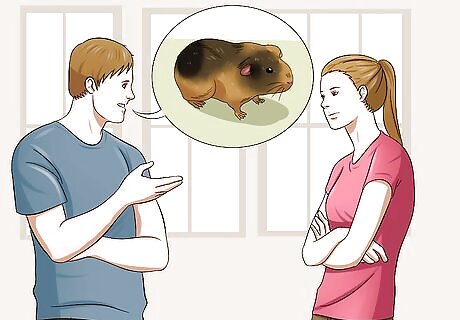
Ask around. Another way to find a guinea pig is by asking other guinea pig owners. They will be able to give you an inside look into the route they took. If you know someone with a guinea pig, ask him where he got his and whether or not he would recommend the shelter or pet shop to you. Ask friends who own guinea pigs to let you know if any of their females have babies. You might be able to adopt from a friend, but remember you'll have to put in some extra research in understanding how to care for guinea pig pups. You can also ask your vet for advice. She might be able to point you in the direction of reputable breeders or quality rescues.
Find a reputable breeder. A knowledgeable breeder with years of experience and expertise generally breeds guinea pigs with a strong bloodline and healthy genes. Purchasing your guinea pig through a breeder may be more expensive, as most reputable breeders only breed purebred guinea pigs for shows or as a hobby. Research registered breeders around your area. Avoid backyard breeders that are unregistered that breed for profit. To identify a reputable breeder, ask for recommendations from an exotic veterinarian or search online guinea pig breeding forums. You can also visit cavy shows to learn more about breeders in your area. Find a breeder that is passionate about breeding and genuinely cares for the welfare of their guinea pigs. A good breeder is not just in the business to make money or profit; they typically don't sell their guinea pigs to the first person that shows with cash in hand. A good breeder is one who is personally involved in each and every sale. Check the breeding facility when you arrive. If the guinea pigs are not adequately cared for, it's likely you are dealing with a backyard breeder and may risk being sold a sick or unhealthy pet. Ask plenty of questions when you arrive.
Preparing for the Commitment
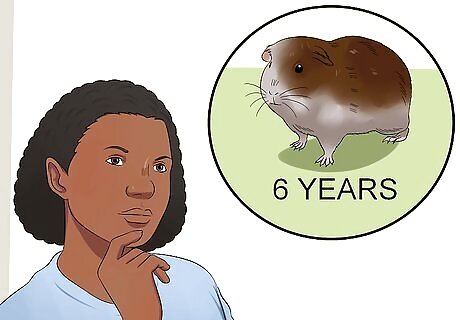
Understand the basics of guinea pig care. Before you purchase a guinea pig, familiarize yourself with the kind of care guinea pigs need. You want to make sure you have the time and money to truly commit to your pet before making a purchase. Guinea pigs are social animals, meaning they thrive when they have a cage mate. Many rescues will want you to adopt a pair together. Consider buying two guinea pigs to make sure your pet is not lonely. However, you should make sure that a male and female are never placed together, as guinea pigs are notorious for breeding. You should never intentionally breed, as it's risky and dangerous. Guinea pigs live to be about 7-10 years of age. Know how old your guinea pig is when you purchase them and how long you can expect them to live. You need to know you're able to commit to the guinea pig for that time frame. Make sure you have access to a vet with the necessary experience to treat your guinea pig. Guinea pigs are often considered exotic pets, meaning not all vets are willing to take them as patents. Find a good vet before buying a guinea pig. Many people purchase guinea pigs assuming they're more of an aesthetic commitment and that, much like fish, are content to roam around unattended. This is not the case. Guinea pigs need time out of their cage to run and explore and like to play with their humans. Your guinea pig will need attention and care each day. If you get a longhaired guinea pig, the commitment will be even greater, as daily grooming is necessary. If you have cats, reconsider getting a guinea pig. Cats will view your guinea pig as prey. If you have cats, make sure there's a space you can keep your guinea pig's cage that's out of their reach. However, never put a guinea pig cage outside. Guinea pigs do not tolerate the cold well.

Buy guinea pig food. Before you purchase your guinea pig, make sure you have adequate supplies. Start with selecting a good brand of food for your pet. Guinea pig food is sold at most pet stores. You should choose a diet specifically made for guinea pigs, as you want to make sure they're getting adequate nutrition from their diet. In addition to their pet store food, guinea pigs also need to eat fresh vegetables and hay as their daily meal.
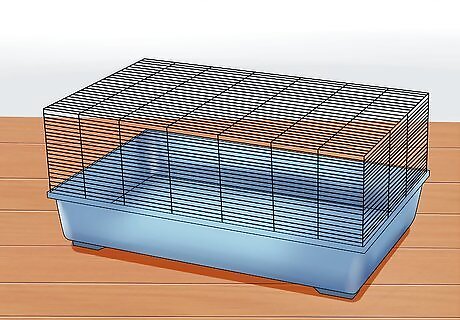
Get a cage and the appropriate accessories. Your guinea pig will need a cage as guinea pigs cannot be left out in a home unsupervised. You can find a cage at a pet store or online. Visit a well known retailer, like Petco or Pet Smart, or a reputable local business. You want to make sure workers can answer any questions you may have. Your guinea pig's home should be well-ventilated and big enough to store a food bowl, water bottle, and bedding. The minimum size requirement for one to two guinea pigs is 7.5 square feet of floor space. Bigger is generally better. This is especially the case if you have two or more guinea pigs, as territorial disputes are less likely in a larger cage. Having a bedding area is also important. Guinea pigs should have access to hay or grass to burrow in and guinea pig safe beds can be purchased at most pet stores. Make sure you designate a specific area of the cage for sleep.
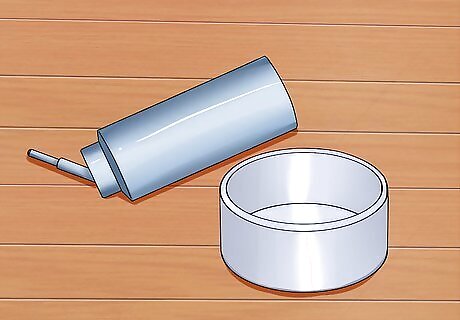
Purchase a water bottle and bowl. You need a water bottle and bowl to store your guinea pig's food. Your guinea pig will need a water bottle, not simply a bowl to store water. This is because guinea pigs can be slightly messy and you want to make sure their water is free of debris and food. You can purchase a water bowl to attach to a cage at a pet store. Some cages come with a water bottle attached. Food bowls can also be purchased at pet stores. Opt for a ceramic bowl instead of a plastic one. This prevents your guinea pig from tipping it over.
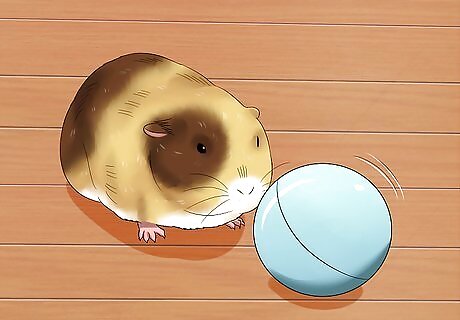
Find the right toys. Guinea pigs like to play, so make sure to have a variety of toys available for your pet before you move them into your home. Hidey houses are one option, which are small houses made of wood or cardboard that can be placed in a guinea pig's cage. They can be purchased online or you can make your own hidey house using cardboard. In general, you should have one hidey house for the each of your guinea pigs plus one extra one. This reduces fighting. Small balls can be purchased at pet stores, which guinea pigs love to throw and chase. It's safer to go buy a toy specifically marketed for guinea pigs as the material used in other pet toys might not be guinea pig safe. Guinea pigs also love to chew. Household items, like paper towels or toilet paper rolls, can be placed in their cage for entertainment.
Selecting Your Guinea Pig

Decide on the gender. Before you make your selection, decide if you want a male or female. If you're purchasing guinea pigs in pairs, make sure to get two of the same gender. Two males or two females tend to get along better than guinea pigs of the opposite sex and there is no risk for accidental breeding. If you're new to guinea pigs, it's best to go with the safer route and choose same gendered pairs. You should never intentionally breed your guinea pigs. Males can be territorial. If you do get two males, opt for a larger cage to reduce tension over territory However, any time you have a pair of guinea pigs, be sure to duplicate things like hides and bowls so that there is no tension over resources when you first bring your guinea pigs home. Some places will refuse to sell mixed genders, as guinea pigs constantly breed and don't stop. Sows have a 20% mortality rate during pregnancy. It is highly frowned upon to breed as it can be dangerous for the sow and pups.

Choose a breed. Guinea pigs come in a variety of breeds and cross-breeds. Get a general sense of what type of guinea pig you're looking for before making the selection. Longhaired guinea pigs, like Peruvians or Shetlands, will need daily grooming to maintain a sleek, tangle-free coat. If you like the look of a longer haired guinea pig, keep in mind the added time commitment. You will also need to occasionally get your guinea pig trimmed, so make sure you find a groomer. If you're getting a guinea pig from a rescue, you'll probably end up with some kind of cross breed. Ask the workers at the rescue about the traits of each breed. Your guinea pig's ancestry is comprised, so make sure the guinea pig's personality is matching with your needs and wants as a pet owner.
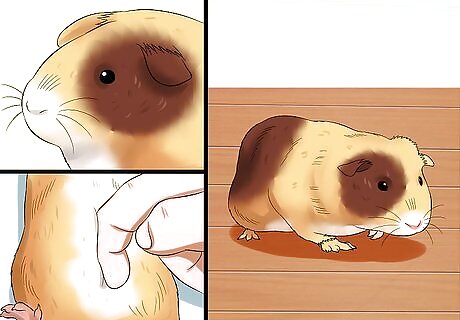
Make sure your chosen guinea pig is healthy. When looking at potential guinea pigs, know how to recognize good health. Healthy guinea pigs run around on all fours. Be wary of sluggish guinea pigs, especially those with flaky skin and bald patches. Guinea pigs should have smooth hair, steady breath, and their eyes and ears should be clear, bright, and free of discharge. Feel the guinea pig's body to make sure it's plump and free of any unusual lumps or swelling.



















Comments
0 comment